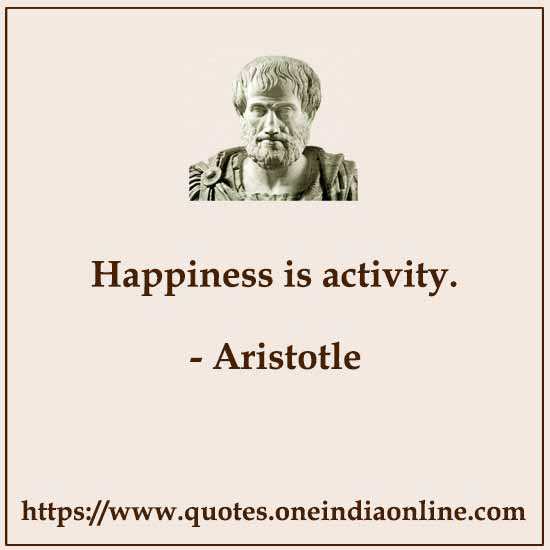Happiness is activity.
Aristotle Quotes in English

Aristotle’s quote “Happiness is activity” captures his belief that true happiness, known as eudaimonia, is more than just a short-lived feeling. Instead, it is about how we live our lives and the things we do every day. It encourages us to be actively involved in meaningful pursuits and to engage in actions that reflect our values and virtues. Let’s explore this idea more deeply.
First, happiness, or eudaimonia, is a term that Aristotle used to describe what many people think of as happiness but is better understood as "flourishing" or "living well." For him, happiness is the ultimate goal humans strive for, a state we seek for its own sake. It is not simply about feeling good or experiencing pleasure. Instead, it means living a life that is full, rich, and satisfying. This perspective shows that happiness is about the quality of our lives rather than just fleeting moments of joy.
Second, Aristotle emphasizes that happiness comes from engaging in activities that align with virtue. This means that a happy life is not just about seeking pleasure but about taking part in actions that are meaningful and ethical. Virtues like courage, wisdom, and justice play a central role in this process. By focusing on these qualities, individuals can engage in activities that not only fulfill them but also contribute positively to their character and society. Thus, happiness is about striving for our highest potential and becoming the best version of ourselves through our actions.
Next, Aristotle highlights the importance of habits in achieving happiness. He believed that cultivating good habits is essential for developing a character that naturally seeks to do good. By consistently choosing to act with virtue, we form habits that shape our lives over time. This means that happiness is something we build and maintain through our daily choices and behaviors. It is not merely a random occurrence but rather something we create through our commitment to living well.
Furthermore, Aristotle sees happiness as an active engagement with life itself. This idea stands in contrast to the notion of passive enjoyment, which might offer temporary pleasure but lacks lasting importance. Happiness, according to Aristotle, requires effort, dedication, and a focus on both personal goals and the well-being of the community. This active approach suggests that leading a purposeful life is crucial for achieving true fulfillment and happiness.
Lastly, Aristotle argues that our ability to reason sets humans apart. He believes that genuine happiness arises from rational activity. This means that true fulfillment comes when we engage our minds, seek wisdom, and apply reason in our choices. Engaging in thoughtful decision-making and using our intellect are key elements in the pursuit of happiness. This rational approach leads to actions that enrich our lives and the lives of those around us.
In summary, when Aristotle states that “happiness is activity,” he emphasizes that a fulfilling life is filled with purposeful actions rooted in virtue. It involves using our rational abilities to engage deeply with life, continually striving to be better, and building habits that reflect our values. Happiness, for Aristotle, is an ongoing journey of living well, rather than a simple state of feeling pleasure. This active pursuit leads to lasting fulfillment and a sense of well-being.